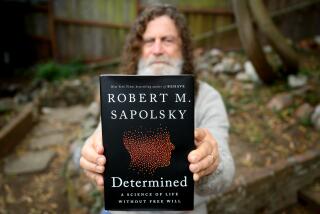When it comes to weight loss, bad habits die hard
- Share via
On a recent doctor’s visit, a compelling health video was looping in the reception room. It incorporated many of the accepted rules for achieving a healthy weight. The motivational video, tailored to the doctor’s clientele, illustrated simple ways to eat more fruits and vegetables and get exercise. It was striking, however, that many of the nursing staff, who must have heard this video a thousand times, didn’t seem to have taken it to heart. Nurses, as a national study revealed, are just as likely to overeat as the rest of the population.
How to explain this puzzle, in which the expert professionals who most intimately understand the health risks of being overweight subject themselves to these risks?
The explanation is important because the American Medical Assn. now classifies obesity as a disease. Doctors are being encouraged to talk with at-risk patients about their treatment options. For starters, they should recognize the limits of the usual advice — the kind commonly found in health videos — when it comes to changing diet and exercise. Encouraging willpower and improving our nutrition education are not scientifically plausible solutions to our unhealthy lifestyles. Research in psychology and neuroscience is beginning to explain why.
Much of our daily behavior is not a product of thoughtful deliberation, as we like to think, but instead is habitual. Habits involve automatic associations between environmental cues and responses, along with certain brain regions. The sight of a fast-food restaurant, for example, can trigger the thought of buying a big burger; a glimpse of the TV in the living room can prompt us to abandon a planned run in favor of collapsing on the couch.
Our research shows that about 45% of daily behavior is repeated regularly and is thus susceptible to habit formation.
Habitual behavior implicates parts of the brain that have relatively sparse connections to other brain areas involved in conscious decision-making (willpower) and goal setting. In effect, our bad habits represent neural islands, pretty much cut off from our thoughtful planning. We really can be of two minds — knowing and wanting to do the right thing but also unconsciously driven by habits triggered by the everyday contexts in which we live. In other words, willpower has limited command over our habitual mind. On top of that, exerting it is arduous, unpleasant and hence typically short-lived.
So how should we tackle our bad health habits? The real villain here is our tendency to outsource control over our behavior to the environment. Successfully changing our habits requires us to alter the environment in ways that cue healthy behaviors and disrupt unhealthy ones. For example, smoking bans in public places help people quit because they reduce cues associated with smoking — ashtrays, the smell of smoke, cigarette butts.
New York Mayor Michael R. Bloomberg’s latest plan to treat obesity — encouraging building designs that nudge people toward staircases instead of elevators — would similarly restructure the environment to cue healthy behaviors and disrupt unhealthy ones. Increasing the availability of fruits and vegetables and decreasing access to sugary drinks, as well adding safe and attractive bikeways and walking paths to city planning protocols — all would have the effect of making healthy choices easier than unhealthy ones.
We also can cue healthy behaviors on our own. Brian Wansink at Cornell University has shown, for example, that healthful eating can be as simple as buying smaller plates, forks, and spoons, so that we serve and eat hundreds fewer calories at each meal. Research we’ve done shows that simply using your non-dominant hand to snack is sufficient to block mindless eating habits and put the conscious mind in charge of what and how much you consume.
Of course, bad habits die hard. Because they come to mind automatically, they are the default responses when people are distracted, tired, or drained of willpower. We wondered, would good habits be equally resilient?
To test good habits, we followed students for a semester, including during exams, to determine how they responded to pressure. When exams drained their willpower, students with unhealthy eating habits doubled down on consuming junk food like doughnuts for breakfast. But habitual oatmeal eaters also stuck to their healthful habits. They did not have the cognitive energy to disrupt them. The stress of daily life made them default to their better selves.
Although there’s nothing worse than a bad habit, few things are more valuable than a good one. Improving health requires stopping the bad and starting the good by making healthy behavior easier to perform so that it becomes part of our daily routines. Entertaining videos and diet programs touting willpower might convince the rational mind, but they have little effect on lifestyle diseases such as obesity — the habitual mind is pulling too many of the strings.
Wendy Wood is a professor of psychology and business at USC. David Neal is a psychologist specializing in behavior change.
More to Read
A cure for the common opinion
Get thought-provoking perspectives with our weekly newsletter.
You may occasionally receive promotional content from the Los Angeles Times.









